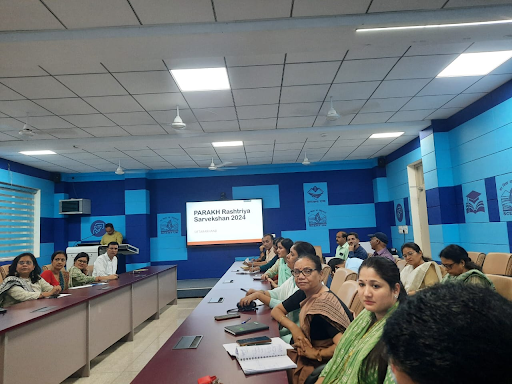The session began with a detailed presentation by Dr. Deepak Pratap Singh, a faculty member of the Assessment Cell, who outlined Uttarakhand’s performance in NAS 2024 across Classes 3, 6, and 9. The report revealed a concerning decline in student achievement in comparison to previous years and national averages across core subjects, such as Language, Mathematics, Science, and Social Science. Particularly worrying was the dip in foundational numeracy and literacy skills and middle-grade competency.
The following are the key highlights from the feedback and discussion:
-
Director Bandana Garbyal emphasized the need for teamwork and a visionary action plan, highlighting that the current trajectory necessitates an urgent shift in educational strategies. She stressed that technology-enabled assessment systems must be developed to ensure timely feedback and data-driven teaching interventions.
-
Deputy Director Ajeet Bhandari suggested a robust enhancement of the assessment framework and recommended the use of Vidya Samiksha Kendra (VSK) to institutionalise regular and real-time assessments in schools.
-
Pallavi Nain underscored the absence of a strong monitoring mechanism and proposed systematic school-level monitoring to ensure that learning outcomes are achieved as per the benchmarks.
-
Dr. K. N. Bijalwan offered insight into aligning assessments with NCERT’s Learning Outcomes (LOs) and stressed the importance of planning assessments that are competency-based, focused, and learner-centric.
-
Bhuwnesh Pant provided a ground-level view of the prevailing conditions in schools that are likely contributing to the declining performance, including pedagogical and infrastructural gaps.
-
Dr. Ajay Chaurasiya added that field-level monitoring by SCERT must be more regular and outcome-focused to enable effective instructional reform.
-
From the IT department, R.P. Badoni expressed complete agreement with the Director’s vision of integrating digital assessment tools, and discussions began on piloting technology-led initiatives for the same.
The meeting concluded with a clear directive: Uttarakhand must reimagine its assessment ecosystem, strengthen data analytics, provide timely teacher training, and foster inclusive, skill-integrated, and safe learning environments.
SCERT Uttarakhand will soon formulate a multi-phase action plan based on these discussions, in line with the post-survey intervention framework outlined in the NAS 2024 report, which includes:
-
Immediate training of district-level master trainers
-
Gap analysis and dissemination of findings
-
Medium-term item bank creation and planning
-
Long-term curriculum reform
This meeting was not just a review but a resolute call to action with all faculties. With focused collaboration and forward-thinking strategies, SCERT Uttarakhand is determined to uplift educational outcomes and ensure no learner is left behind.
Reference: NAS 2024 Report, SCERT Uttarakhand


